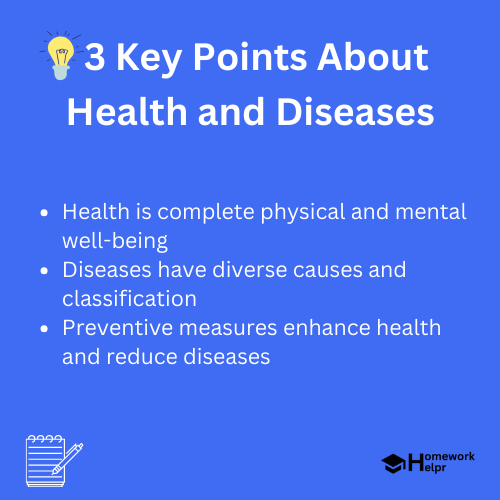📝 Summary
Health and diseases are vital concepts impacting our lives significantly. Health is defined as a state of complete physical, mental, and social well-being, extending beyond merely the absence of diseases. Diseases, on the other hand, present specific symptoms and can arise from various factors including genetics and lifestyle choices. Prevention is crucial, as it is often more effective than treatment. Regular exercise, a healthy diet, and routine check-ups contribute to maintaining health. Additionally, immunizations play a critical role in preventing infectious diseases, fostering both individual and public health through herd immunity. Understanding these concepts empowers individuals to make informed health choices and improve their overall quality of life.
Understanding Health and Diseases
Health and diseases are fundamental concepts that play a crucial role in our daily lives. Understanding these two aspects can help us lead a better life. Health is defined as a state of complete physical, mental, and social well-being. It goes beyond just the absence of disease; it includes our overall quality of life. On the other hand, diseases are characterized by specific symptoms and signs and can be caused by a variety of factors such as genetics, lifestyle, and environment.
The Importance of Health
Maintaining good health is essential for a fulfilling life. When we are healthy, we can perform daily tasks with more energy and enthusiasm. Good health contributes to our productivity, interpersonal relationships, and overall happiness. There are several key aspects to consider when discussing health:
- Physical Health: This involves exercise, nutrition, and regular check-ups.
- Mental Health: Emphasizes the importance of emotional well-being and mental illness management.
- Social Health: Focuses on building positive relationships and community engagement.

What are Diseases?
Diseases can be classified into different types. Understanding their types is vital for prevention and treatment:
- Infectious Diseases: Caused by pathogenic microorganisms such as bacteria, viruses, fungi, or parasites. Examples include the flu and COVID-19.
- Chronic Diseases: Long-lasting conditions like diabetes and heart disease that often require ongoing management.
- Genetic Disorders: Result from abnormalities in genes or chromosomes, such as cystic fibrosis and Down syndrome.
Each type of disease has its own set of symptoms and treatment options. By knowing how to identify these diseases early, we can improve outcomes.
Definition
Infectious Diseases: Illnesses caused by the invasion of pathogens into the body. Chronic Diseases: Long-term medical conditions that can be controlled but not cured. Genetic Disorders: Health issues caused by abnormalities in genes or chromosomes.
Causes of Disease
The causes of diseases can be complex and multifaceted. Understanding the factors that lead to illnesses is crucial in developing prevention strategies. Some primary causes include:
- Environmental Factors: Pollution, climate change, and exposure to toxins can affect health.
- Lifestyle Choices: Diet, exercise, and smoking habits play a significant role in disease development.
- Genetics: Family history can predispose individuals to certain diseases.
💡Did You Know?
Did you know that an average of 80% of chronic diseases can be prevented through a healthy lifestyle?
Prevention of Diseases
Preventing diseases is often easier and more cost-effective than treating them after they occur. Here are some effective prevention strategies:
- Regular Exercise: Aim for at least 30 minutes of physical activity most days of the week.
- Healthy Eating: Incorporate fruits, vegetables, whole grains, and lean meats into your diet.
- Routine Medical Check-ups: Early detection can lead to better management of diseases.
Example
For instance, regular health screenings can detect conditions like high blood pressure or diabetes before they become serious.
The Role of Immunization
Immunizations are a crucial part of preventing infectious diseases. Vaccines help our body develop immunity without causing the disease. A well-timed immunization schedule is beneficial for all age groups:
- Children receive vaccines to protect against diseases like measles and polio.
- Adults may need booster shots to maintain immunity.
- Certain vaccines can help prevent cancers, like the HPV vaccine.
By getting vaccinated, individuals contribute not only to their health but also to the public health by creating herd immunity.
Definition
Immunizations: A process that helps the body develop resistance to infections. Herd Immunity: When a sufficient percentage of a population is immune to an infectious disease, reducing its spread.
The Mental Health Connection
Mental health is as important as physical health. Poor mental health can lead to physical illnesses, and vice versa. The relationship is bidirectional:
- Stress: Chronic stress can lead to heart disease and other illnesses.
- Anxiety and Depression: These conditions can manifest as physical symptoms like fatigue and pain.
- Social Isolation: A lack of companionship can lead to deteriorating health conditions.
Example
For instance, someone experiencing anxiety may develop gastrointestinal issues as a physical manifestation of their mental state.
Conclusion
In conclusion, understanding health and diseases is critical for everyone, especially students. By educating ourselves on the importance of maintaining good health through proper lifestyle choices, prevention strategies, and mental well-being, we can significantly impact our lives and the lives of those around us. Being informed allows us to make proactive decisions to prevent diseases, live healthier, and encourage a community of well-being. Remember that every small step counts, and together we can work towards a healthier future!
Related Questions on Health and Diseases
What is health?
Answer: Health is a state of complete physical, mental, and social well-being, not just the absence of disease.
What are the main types of diseases?
Answer: Diseases can be classified into infectious, chronic, and genetic disorders.
How can we prevent diseases?
Answer: Preventive measures include regular exercise, healthy eating, and routine medical check-ups.
What is the importance of mental health?
Answer: Mental health is crucial as it influences physical health and overall well-being, fostering a holistic approach to health.
